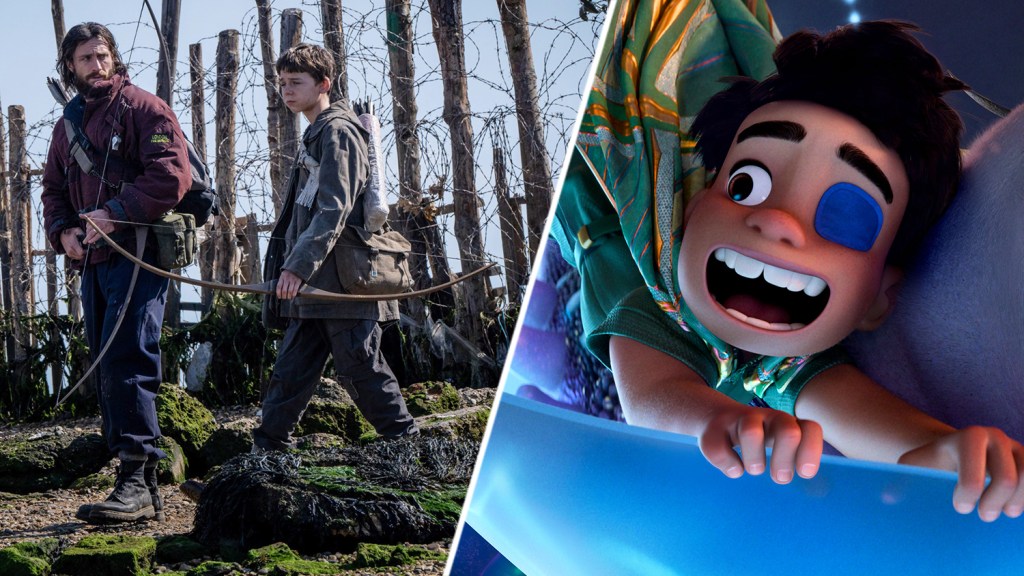Box Office Showdown: Sony’s ’28 Years Later’ vs. Pixar’s ‘Elio’ – Who Will Prevail?
Updated Saturday AM: As intellectual property (IP) continues to dominate box office discussions, Sony’s decision to revive a dormant cult British zombie franchise with 28 Years Later is garnering significant attention. Directed by Danny Boyle, the film is a follow-up to his iconic 28 Days Later, originally released in 2002. Meanwhile, Disney/Pixar’s efforts to introduce original content with a $150 million budget for Elio also highlight the ongoing struggle for originality in an increasingly franchise-driven industry. The juxtaposition of these two films reflects the complexities of the modern cinematic landscape.
The Mixed Reception of 28 Years Later
Currently, 28 Years Later is positioned to gross between $30 million to $31 million during its opening weekend. It has received a B CinemaScore, a decent score for horror films, although its Rotten Tomatoes score hovers around a disappointing 66%. Despite this, the film’s overall reception suggests that it appeals to hardcore fans and critical circles rather than casual moviegoers.
Key Reception Metrics:
- Opening Weekend Projection: $30-31 million
- CinemaScore: B
- Rotten Tomatoes Score: 66%
- PostTrak Recommendation Rate: 52%
The film’s marketing campaign notably featured a gripping trailer that garnered 60.2 million views within its first 24 hours, the second-best ever for a horror film advertising push. This aggressive marketing strategy raises a pivotal question: Did the haunting imagery and gripping narrative in the trailer lead to greater box office returns than anticipated? Critics and fans appear to appreciate the film’s pacing, while some horror aficionados have pointed out that it does not maintain a constant thrill throughout, leading to noticeably slow moments and audience exits.
Elio Struggles to Find Its Footing
On the other side of the box office, Elio has opened to disappointing numbers with projections falling between $22 million and $24 million for its first weekend. This figure marks it as the lowest opening for a Pixar film, trailing behind the initial opening of Toy Story back in 1995, which grossed $29.1 million. Yet, despite the lukewarm box office reception, audience scores are encouraging, with an A CinemaScore and an A+ rating from those under 25.
Key Metrics for Elio:
- Opening Weekend Projection: $22-24 million
- CinemaScore: A
- Audience Score for Under 25: A+
This raises critical concerns about the effectiveness of Pixar’s marketing strategy. Although Pixar has successfully built emotional narratives into their films in the past, the current landscape seems to be challenging the studio’s ability to pull in viewers. RelishMix reports that Elio‘s pre-release social media buzz was pacing 30% lower than previous family-friendly animations. The film’s initial promotion did not yield the expected excitement, possibly leading to a reduced opening trajectory.
The Battle for Audience Attention
The box office battle this weekend illustrates the challenges of launching original creative content in a marketplace inundated with established franchises. While studios can swing for the fences with new concepts, the risks of underperformance are real and numerical. For distinctions:
- Audiences for 28 Years Later: Predominately male (49% over 25), highlighting the film’s appeal to older demographics.
- Diversity Demos: 46% Caucasian, 25% Latino, 12% Black, and 10% Asian American.
- Leading Cinema Performance: AMC Burbank, grossing approximately $66K.
Despite Elio‘s critical praise and audience satisfaction, the film did not create a strong enough buzz or excitement, pointing to a potential need for improved marketing strategies in the future. Many viewers have expressed concerns about Pixar’s recent track record, which could overshadow the actual quality of the film.
Market Insights and Future Expectations
As the weekend progresses, industry watchers will closely monitor the performance of both films amidst the highly competitive box office landscape. Meanwhile, Universal and DreamWorks Animation’s How to Train Your Dragon is expected to lead the box office with an impressive $35 million in its second weekend, showcasing the continuing allure of established franchises over fresh concepts.
In summary, this weekend’s box office performance illustrates two contrasting paths: the revival of beloved franchises like 28 Years Later and original storytelling efforts like Elio. As audience tastes evolve, both studios will likely need to adapt their approaches to truly resonate in a market where nostalgia often trumps originality.






